Editor:
Brandon Sweet
University Communications
bulletin@uwaterloo.ca
AVP Equity, Diversity, Inclusion and Anti-Racism issues statement on racial violence
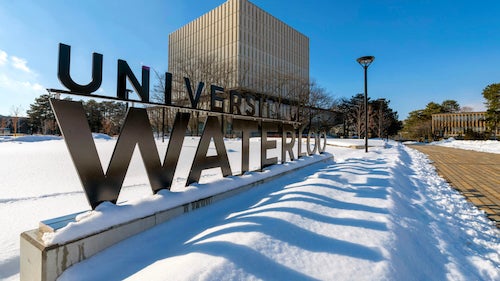
A message from Dr. Christopher Taylor, Associate Vice-President, Equity, Diversity, Inclusion and Anti-Racism.
Dear Waterloo community,
I, like many of you, have been watching the news about recent incidents of violence in the United States motivated by hate. Personally, I’m tired of waking up every morning to pain, death, and suffering. Of people that look like me. That look like many of you.
The mass shooting during Lunar New Year celebrations in California and subsequent shooting in a small nearby agricultural community targeting newcomers is felt by not only those who lost loved ones, but by all of us.
And on Friday, the dehumanization of Black bodies was once again put on display when video footage of the murder of Tyre Nichols at the hands of Memphis police was released to the public.
These are the stories that are currently dominating our news feeds and they are tragic. We see them and we are hurt.
Also tragic are the stories that don’t grab the world’s attention. The stories of less sensational, but no less brutal acts of violence that are motivated by racism and hate. These happen in our communities almost every day. They happen in Canada almost every day – we are not immune.
It’s our responsibility to pay attention to big news stories and to the small news stories.
So today I remember the victims in the Lunar New Year and agricultural worker shootings. I remember Tyre Nichols. And I also remember these Canadians, just three examples from an endless list of victims of racialized violence here at home:
Safiullah Khosrawi, 15 – who was gunned down in 2020 outside his school, Woburn Collegiate.
Kartik Vasudev, 21 – who was shot on his way to work last summer.
Nyima Dolma, 28 – who was set on fire on public transportation also in the summer of 2022.
I also think today about the thousands of families grieving and being retraumatized by the seemingly unending stream of news about newly discovered graves at former Residential School grounds.
I think about the Jewish community being targeted with Swastikas scrawled on Synagogues so often that the incidents don’t always even make the local news. And I think about a woman wearing a Hijab walking down the street in broad daylight being attacked and having that Hijab violently torn from her body.
It’s not just this kind of explicit violence that racialized Canadians must contend with either. We know that racialized communities face many barriers. We live in a neo-liberal and settler colonial system that embeds systemic oppression within our institutions.
Waterloo is working to change this through initiatives like PART, but change can’t come fast enough. Some days this work feels heavy, for me and for my team. But we push on because we have to if we are going to make this university better.
I’m writing today to acknowledge this moment of explicit pain and trauma, to make sure that you know that there are supports for you at Waterloo if you are struggling right now, but I’m also writing so that you know that Waterloo sees you.
We do. I do.
Dr. Christopher Taylor
Associate Vice-President, Equity, Diversity, Inclusion and Anti-Racism
Support for Students
- Counselling Services - 519-888-4096 (#2 on prompt for Counselling Services)
- EmpowerMe, Student Assistance Program
- Student Health Benefit (for private counselling)
- UW Chaplains
- Mates (peer support) - mates@wusa.ca
- Here 24/7 - 1-844-437-3247
- Health Services - Student Medical Clinic - 519-888-4096
- Grand River Hospital - 519-749-4300
- St. Mary's Hospital - 519-744-3311
- Good2Talk - 1-866-925-5454
- Crisis Services Canada - 1-833-456-4566 or by texting 45645
- The Coping Centre
- Bereaved Families of Ontario-Midwestern Region
- Canadian Mental Health Association: Specific for support in grieving
Employee-based support for faculty and staff
- Employee and Family Assistance Plan
- Employee Extended Health Benefits (private counselling)
WATonoBus gets green light to offer shuttle service on campus
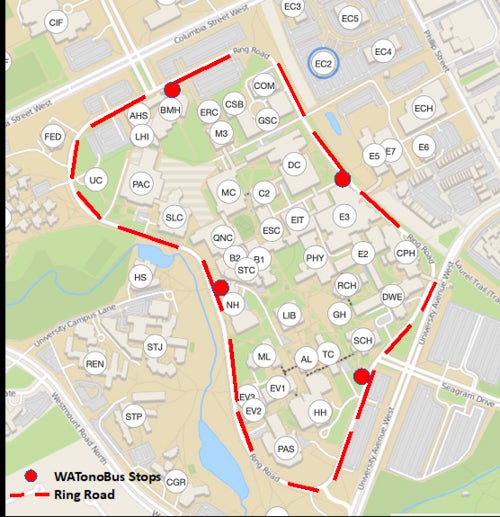
The University of Waterloo’s all-weather, self-driving bus, the WATonoBus, has hit the road with official go-ahead from Ontario’s Ministry of Transportation.
Students, staff, faculty and visitors can enjoy the ride with a complimentary WATonobus shuttle service operating every Monday to Friday, from 9:30 a.m. to 10:30 a.m.
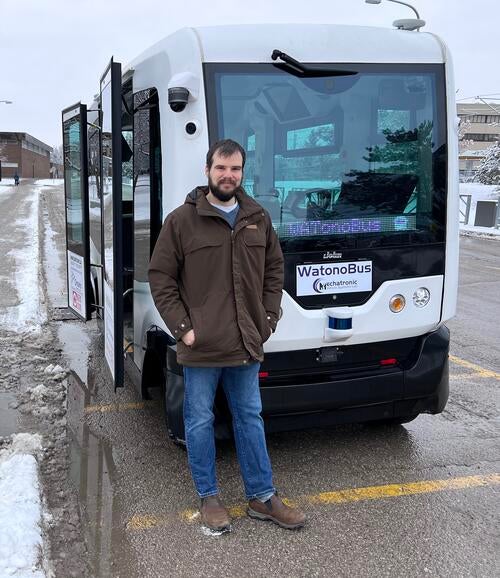
Aaron Sherratt, WATonoBus technician, poses in front of the shuttle's Davis Centre stop.
Travelling a 2.7-km route around campus, the WATonoBus makes four stops along the university's Ring Road – Davis Centre, South Campus Hall (Seagram Drive), Needles Hall and B.C. Matthews Hall (Columbia Street) – and can carry up to ten passengers.
Simply track the shuttle’s location and schedule on the WATonoBus mobile app, wait at a designated stop for it to pull up curbside and jump on board.
WATonoBus was developed at the Mechatronic Vehicle Systems (MVS) Lab and is part of the province's Automated Vehicle Pilot Program, which allows driverless cars as long as a safety operator is on board.
Equipped with multiple cameras, Lidars, radars, GPS and an in-house-developed software system, it senses traffic, pedestrians and cyclists to drive autonomously on the busy campus Ring Road safely.
For more information, please visit the MVS Lab and the WATonoBus websites.
Hop on the trolley to attend a book talk about streetcars and urban geography
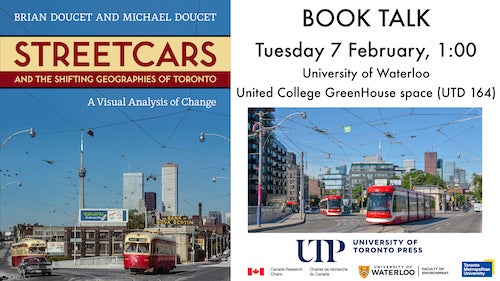
Dr. Brian Doucet of the School of Planning is hosting a book talk entitled Streetcars and the Shifting Geographies of Toronto: a visual analysis of change on Tuesday, February 7.
"What can photos a city’s past reveal about contemporary urban challenges? This is the question explored by Brian and Michael Doucet in their book Streetcars and the Shifting Geographies of Toronto: a visual analysis of change. To answer this question, the Doucets select a quintessentially Toronto resource: photos taken by streetcar enthusiasts."
"These enthusiast-photographers did not intend to document processes such as deindustrialization, shifting demographics, gentrification and the rise of the post-industrial economy. They were primarily interested in the vehicles themselves. But for the Doucets, it’s everything around these vehicles that sheds important insights into how Toronto has changed and why through their depiction of ordinary, everyday spaces that otherwise would have gone unphotographed."
"In this book, Brian and Michael Doucet carefully and meticulously crisscross the city with these old images in hand, and carefully and meticulously rephotograph these old images. This technique is known as repeat photography and is a growing approach to understand how big forces of change manifest themselves in the built environment, streets and urban form. Critical visual analysis helps us understand that there is nothing natural, or inevitable about cities and how they change, and it helps to connect our own observations to wider shifts within our societies."
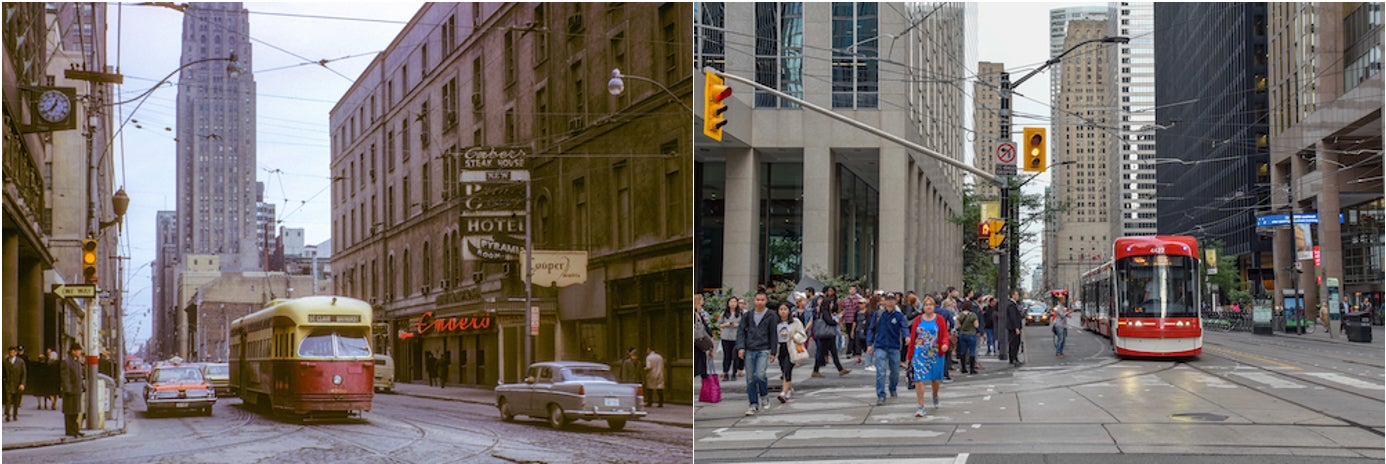
The intersection of King St. and York St. in Toronto. On the left, a photo taken by John Bromley in 1966. On the right, a photo taken by Dr. Brian Doucet in 2019.
"Repeat photography does this by bringing old images into dialogue with contemporary planning, policy, political and public debates. These photo sets show the subtle and not-so-subtle economic, social, demographic and spatial changes that have taken place as Toronto has transitioned from an industrial and provincial city, to one of the world’s major global metropolises."
The book was published in 2022 with the University of Toronto Press, and was co-authored with Doucet's father, Michael, who is Professor Emeritus at Toronto Metropolitan University. The book was featured in the Toronto Star recently in an article written by Edward Keenan and the Doucets wrote about their work in urbanist magazine Spacing last year.
"Join us for this engaging and insightful discussion about how photography can be used to better understand cities and urban change," says the event copy.
The event takes place on Tuesday, February 7 from 1:00 p.m. to 2:30 p.m. at the United College GreenHouse (UTD 164). Refreshments will be provided. No registration is required. A limited number of copies will be available for purchase at a discounted price.
Brian Doucet is the Canada Research Chair in Urban Change and Social Inclusion in the School of Planning at the University of Waterloo. Michael Doucet is an Emeritus Professor in the Department of Geography at Toronto Metropolitan University.
Sustainability Action Fund open for applications until February 15
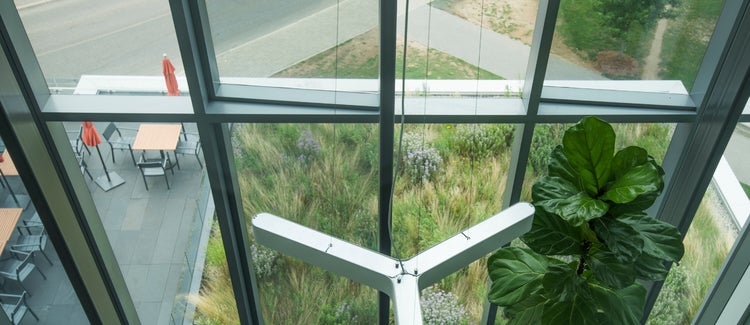
A message from the Sustainability Office.
Have a project idea to advance sustainability on campus?
The Sustainability Action Fund is now accepting applications for projects that will work towards the University’s Environmental Sustainability Strategy. Projects can include infrastructure improvements, campaigns, or activities to increase awareness of sustainability issues on campus, and programs to support sustainable behaviours.
Applicants can request between $2,000 and $30,000 in funding this term, and can be led by staff, students, or faculty members.
Some examples of past projects that have successfully received funding include:
- Reusable containers marketing;
- SDG youth training conference;
- Secure bike cage;
- Standardized waste receptacles;
- Arts/Environment gardens signage; and
- Biology Growth Chamber retrofit.
The deadline for applications is Wednesday, February 15. Full details and instructions are available on the Sustainability Action Fund webpage.
Link of the day
"Hurricane Hazel" McCallion, 1921-2023
When and Where to get support
Students can visit the Student Success Office online for supports including academic development, international student resources, immigration consulting, leadership development, exchange and study abroad, and opportunities to get involved.
Instructors looking for targeted support for developing online components for blended learning courses, transitioning remote to fully online courses, revising current online courses, and more please visit Agile Development | Centre for Extended Learning | University of Waterloo (uwaterloo.ca).
Faculty, staff, post-doc and graduate student instructors can find upcoming teaching and learning workshops, self-directed modules and recordings of previous events on Centre for Teaching Excellence Workshops and Events page.
Instructors can access the EdTech Hub to find support on Waterloo’s centrally supported EdTech tools. The Hub is supported by members of IST’s Instructional Technologies and Media Services, Centre for Teaching Excellence, Centre for Extended Learning and subject matter experts from other campus areas.
Supports are available for employees returning to campus. Visit IST’s Hybrid Work and Technology guidelines and workplace protocols to assist with the transition.
Students with permanent, temporary and suspected disabilities and disabling conditions (medical conditions, injuries, or trauma from discrimination, violence, or oppression) can register with AccessAbility Services for academic accommodations (classroom accommodations, testing accommodations, milestone accommodations).
Instructors can visit AccessAbility Services' Faculty and Staff web page for information about the Instructor/Faculty role in the accommodation process. Instructors/Faculty members are legally required to accommodate students with disabilities. AccessAbility Services (AAS) is here to help you understand your obligations, and to offer services and resources to help you facilitate accommodations.
The Writing and Communication Centre has in-person and virtual services to support grad and undergrad students, postdocs and faculty with any writing or communication project. Services include one-to-one appointments, drop-ins at Dana Porter Library, online workshops, writing groups, English conversation practice, and custom in-class workshops.
Research Ethics: Find yourself with an ethical question, unsure if your work requires an ethics review, or need advice about putting together a research ethics application? Reach out to one of our friendly staff by booking a consultation or email us with your questions.
Co-op students can get help finding a job and find supports to successfully work remotely, develop new skills, access wellness and career information, and contact a co-op or career advisor.
The Centre for Career Action (CCA) has services and programs to support undergrads, grad students, postdocs, alumni, and employees in figuring out what they value, what they’re good at, and how to access meaningful work, co-op, volunteer, or graduate/professional school opportunities. Questions about CCA's services? Live chat, call 519-888-4047, or stop by our front desk in the Tatham Centre 8:30 a.m. to 4:30 p.m., Monday to Friday.
Drop-in to in-person Warrior Study Halls on Thursdays from 5:00 p.m. to 6:30 p.m. in DC and DP. Join a Peer Success Coach to set goals and work independently or in groups each week.
Renison's English Language Institute continues to offer virtual events and workshops to help students practice their English language skills.
If you feel overwhelmed or anxious and need to talk to somebody, please contact the University’s Campus Wellness services, either Health Services or Counselling Services. You can also contact the University's Centre for Mental Health Research and Treatment. Good2Talk is a post-secondary student helpline available to all students.
The Library is here to help, both in person and online. Our spaces are open for access to book stacks, study space, computers and printers, and the IST Help Desk. For in-depth support, meet one-to-one with Librarians, Special Collections & Archives and Geospatial Centre staff. Access our resources online for anywhere, anytime learning and research. Full details on current services and hours are available on the Library’s COVID-19 Update webpage.
The Faculty Association of the University of Waterloo (FAUW) continues to advocate for its members. Check out the FAUW blog for more information.
The University of Waterloo Staff Association (UWSA) continues to advocate for its members. Check out the UWSA blog for more information.
The Office of Equity, Diversity, Inclusion & Anti-Racism (EDI-R) works with students, faculty and staff across campus to advance equity and Anti-racism through evidence-based policies, practices and programs. If you have a concern related to Anti-racism and/or equity, please complete our intake form.
The Sexual Violence Prevention and Response Office (SVPRO) supports all members of the University of Waterloo campus community who have experienced, or been impacted, by sexual violence. This includes all students, staff, faculty and visitors on the main campus, the satellite campuses, and at the affiliated and federated Waterloo Institutes and Colleges. For support, email: svpro@uwaterloo.ca or visit the SVPRO website.
The Office of Indigenous Relations is a central hub that provides guidance, support, and resources to all Indigenous and non-Indigenous campus community members and oversees the University's Indigenization strategy.
The Waterloo Indigenous Student Centre, based at United College, provides support and resources for Indigenous students, and educational outreach programs for the broader community, including lectures, and events.
WUSA supports for students:
Peer support - MATES, Glow Centre, RAISE, Women’s Centre - Click on one of the links to book an appointment either in person or online for the term.
Food Support Service food hampers are currently available from the Turnkey Desk 24/7 in the Student Life Centre. Drop-off locations are also open again in SLC, DC, DP, SCH, and all residences.
Co-op Connection all available online.
Centre for Academic Policy Support - CAPS is here to assist Waterloo undergraduates throughout their experience in navigating academic policy in the instances of filing petitions, grievances and appeals. Please contact them at caps@wusa.ca.
WUSA Student Legal Protection Program - Seeking legal counsel can be intimidating, especially if it’s your first time facing a legal issue. The legal assistance helpline provides quick access to legal advice in any area of law, including criminal. Just call 1-833-202-4571.
Empower Me is a confidential mental health and wellness service that connects students with qualified counsellors 24/7. They can be reached at 1-833-628-5589.
GSA-UW supports for graduate students:
The Graduate Student Association (GSA-UW) supports students’ academic and social experience and promotes their well-being.
Advising and Support - The GSA advises graduate students experiencing challenges and can help with navigating university policies & filing a grievance, appeal, or petition.
Mental Health covered by the Health Plan - The GSA Health Plan now has an 80 per cent coverage rate (up to $800/year) for Mental Health Practitioners. Your plan includes coverage for psychologists, registered social workers, psychotherapists, and clinical counselors.
Dental Care - The GSA Dental Plan covers 60 to 70 per cent of your dental costs and by visiting dental professionals who are members of the Studentcare Networks, you can receive an additional 20 to 30 per cent coverage.
Student Legal Protection Program - Your GSA fees give you access to unlimited legal advice, accessible via a toll-free helpline: +1-833-202-4571. This advice covers topics including housing disputes, employment disputes, and disputes with an academic institution.
The Graduate House: Open Monday to Tuesday 11:30 a.m. to 7:00 p.m. and Wednesday to Friday 11:30 a.m. to 9:00 p.m. We’re open to all students, faculty, staff, and community members. The Graduate House is a community space run by the GSA-UW. We’re adding new items to the menu. Graduate students who paid their fees can get discounts and free coffee.
When and Where
Warriors Game Day Tickets and Season Passes, on sale now. Cheer on your Warriors W/M Basketball, Football W/M Hockey and W/M Volleyball teams at home during the 2022-23 season. Purchase today.
Fitness and Personal Training - Registrations opened January 5 this winter with Personal Training and Small Group Training as well as a Free Warrior Workout Program.
Student Health Pharmacy in the basement of the Student Life Centre is now offering Covid booster shots (Pfizer and Moderna) and flu shots. Call 519-746-4500 or extension 33784 for an appointment. Walk-ins always welcome.
Deadline to register for Centre for Extended Learning (CEL) "Getting Ready to Facilitate Online Courses: TA Training – Winter 2023" course, Monday, January 30.
2SLGBTQ+ Fundamentals, Tuesday, January 31, 10:00 a.m. to 12 noon, online.
Warrior Basketball vs. Laurier, Wednesday, February 1, (W) 6:00 p.m., (M) 8:00 p.m., PAC. Shoot for Change, Alliance “We Are One” Game, Mike Moser Day. Buy your tickets today!
The Balsillie School presents The Age of Anarchy: Navigating a World Where Everyone is Connected and No One is in Charge, Wednesday, February 1, 7:00 p.m. to 8:30 p.m., CIGI auditorium and online.
NEW - FASS presents "The Other Side of the Story," Thursday, February 2, Friday, February 3, and Saturday, February 4, 8:00 p.m., Theatre of the Arts. Tickets are pay what you can Thursday, $12 Friday and Saturday.